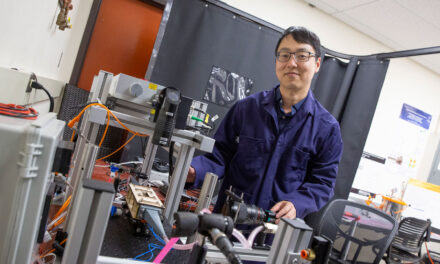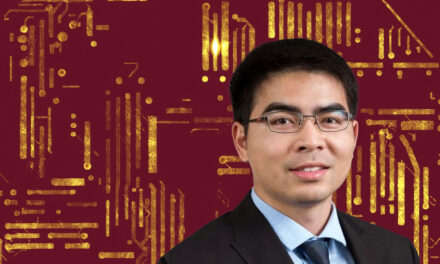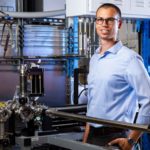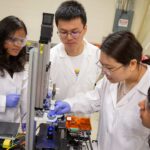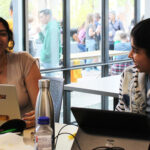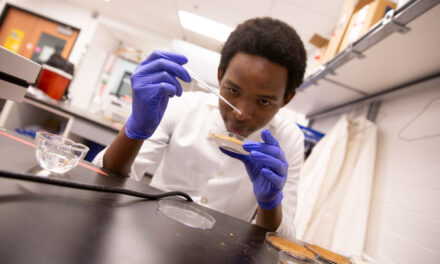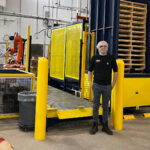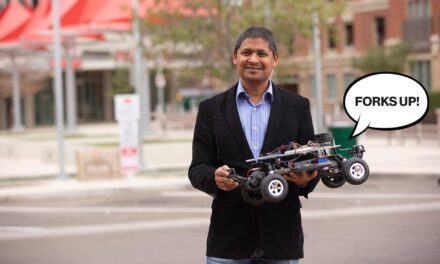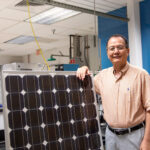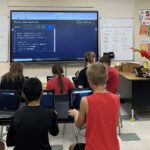
Mentor Dida: Giving back to his Kosovo homeland
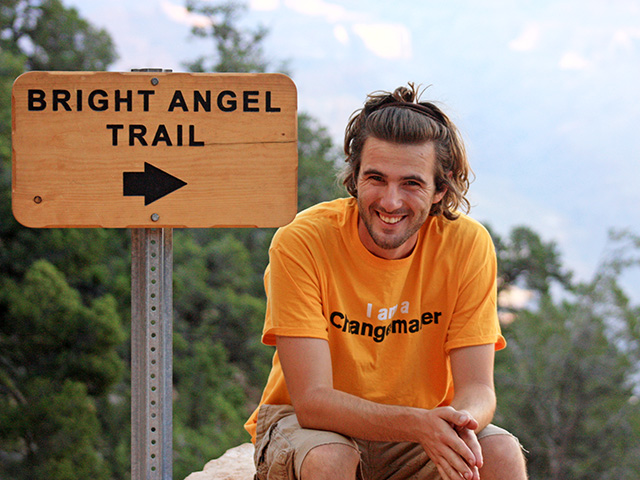
Mentor Dida last spring earned his bachelor’s degree in electronics engineering technology with a focus on alternative energy technologies at the Polytechnic School, one of the Ira A. Fulton Schools of Engineering at Arizona State University. Before returning this fall to work on a master’s degree in global technology and entrepreneurship, he spent the summer in his native Kosovo to work on a project to empower young people to fight poverty in that country.
Mentor Dida’s view of the world changed when he was nine and Serbian police forced his Albanian family out of their home in the capital of Kosovo, herding them onto trains headed for the Macedonian border and a life as refugees.
He was shocked when the family’s Serbian friends did nothing to stop what was happening to them and other Albanian citizens.
“In the end, we will remember not the words of our enemies, but the silence of our friends,” Dida said, quoting Martin Luther King Jr.
Dida, who graduated in May from Arizona State University, pushes aside bitterness and, in its place, cultivates positive ways to improve the world.
He earned a degree in electronics engineering technology with a focus on alternative energy technologies from ASU’s College of Technology and Innovation, one of the Ira A. Fulton Schools of Engineering, and has returned this fall to work on a master’s degree in global technology and entrepreneurship.
This summer, he went back to Kosovo to work on projects to empower young people to take meaningful action toward ending poverty in his home country.
He describes himself as a “simple, young, and ambitious entrepreneur who does not miss an opportunity to help others.”
Aaron Krasnow, assistant vice president and director of ASU Counseling Services, said he met Dida on Dida’s first day on the Polytechnic campus, where Krasnow was the dean of students.
“He came to my office to say hello and tell me about his goals as a student,” Krasnow said. “Of all the students I have met in my 15 years in higher education, Mentor is the absolute top. His maturity, commitment to self and others, passion for solutions, and positivity are unmatched. I honestly have never met anyone like him.”
Krasnow said Dida is a blend of servant leader, thought leader and mentor to others.
“He takes action and is thoughtful,” Krasnow said. “He is passionate and pragmatic. He is serious and loves life. He inspires others and seeks to learn from them as well.”
Dida’s background as a refugee shapes the choices he makes, Krasnow said.
“It gives him a keen understanding of social and political influences on society and makes him focus on pathways to success, like education or sustainable living, that are, at their heart, social justice issues.”
Dida’s grandmother was one of the first Albanian teachers in Kosovo, teaching the Albanian language. His grandfather was the first editor-in-chief of the Albanian newspaper, and was a political prisoner for promoting Albanian interests and values.
His parents are educators, his father was an engineering professor at the University of Pristina, his mother has been an elementary school teacher for 37 years.
“As a family, we were a little bit lucky,” Dida said. “My dad and mom were both educated. My father had offers to work for private companies, but he liked giving back to the community. They didn’t do it for the money.”
Dida and his three older sisters were always told to give back.
His oldest sister is now a piano and music teacher in Pristina, the next a media production manager for a major telephone company in Kosovo, and the third gives music lessons to children who don’t have money.
“I’m the only one in my family who has no musical experience,” Dida said. “The house I grew up in only had two bedrooms, and my sisters were always practicing, on the piano, the violin. There was no place left for me to practice. So I played basketball.”
Dida remembers the day, in 1999, when the family was forced onto trains and separated for several weeks.
“We arrived at the border and it was raining and snowing. We had no tent; our blankets were all wet,” Dida said. “My father gave me his coat.”
Eventually, a sympathetic family from Macedonia took them in until the war ended and they could return.
Dida never forgot the feeling of being vulnerable, and one of his first projects at ASU was working with Mark Henderson, an engineering professor, on the Two Dollar Challenge, a movement to increase awareness of global poverty.
“Mentor is a self-starter with big ideas that he makes into realistic events and activities,” Henderson said. “He works harder than anyone on his team as a great role model.”
The Two Dollar Challenge started in 2006, when Shawn Humphrey, a professor at the University of Mary Washington, asked his macroeconomics class to live for one week on two dollars a day, which more than 45 percent of world’s population does. The students also raised money to contribute to projects that fight poverty.
Three years later, the movement went national, and students on campuses across the country spent a week living in makeshift cardboard shelters and sleeping on the ground.
Dida helped spearhead the effort at ASU, but it wasn’t always easy.
Last year, students built a shelter with cardboard duct-taped on ropes hung from trees near the Polytechnic ASU Student Union. They left their cell phones and wallets at home and pledged not to drive. Just as they were getting ready to go to sleep, the sprinklers came on, soaking the cardboard, the students and their blankets and sleeping bags.
“Everything was wet,” Dida said. “We had to think about whether to go home. We decided that the homeless couldn’t go home, so all of us slept on the cold, hard concrete. It was pretty miserable, but we remember it.”
He said that the first time they took the Challenge, students tried to manage their own $2-a-day budget, but quickly figured it was nearly impossible to get enough to eat.
“We learned that we have to gather the money for mass meals,” he said. “We have to outsmart the system, with spaghetti and tomato sauce, or tortillas and beans.”
Dida said that students missed their beds and had to go to class and work on little or no sleep.
“Once they’ve experienced it, they are more compassionate when they see a homeless person,” Dida said. “That’s what everyone learns. We get to go home after a week to eat, shower, sleep in a warm bed with no bugs. We need to appreciate all of that.”
Dida, who cites fellow Albanian Mother Theresa as an inspiration, thinks we all should have more gratitude.
“The United States has wonderful infrastructure and education,” he said. “Still a lot of people don’t appreciate it and complain. I tell them it’s beautiful. Don’t be sad. Help some other people, who don’t have clean water or food.”
The Challenge has partnered with and raised money for Esperança, an organization that works with local organizations to provide healthcare, clean water, food and shelter to the poor throughout the world.
Garret Westlake, assistant dean of students, worked with Dida through Changemaker Central, ASU’s student-led initiative that supports service and social entrepreneurship to improve the future.
“Mentor’s approach to entrepreneurship is an extension of his strong problem solving abilities,” Westlake said. “He is easily able to identify ‘pain’ in the marketplace and draw from his networks and knowledge to design and implement solutions that alleviate that pain.
“His willingness to take risks in pursuing new ideas, asking others to leave their comfort zones, and expectation for expediency are all attributes of his entrepreneurial spirit.”
Dida and Westlake attended the opening ceremony of the 2014 Clinton Global Initiative University held at ASU, and Dida told Westlake that without President Clinton’s intervention in Kosovo he would never have had the opportunity to pursue higher education in the United States. Later Dida was able to speak briefly with Clinton about his Kosovo project.
“Mentor showed a deep sense of gratitude for the opportunities he has received, as well as a commitment to creating opportunities for others based in his own powerful experiences on the impact that the actions of leaders can have on the world,” Westlake said.
“Mentor is type of leader that emerges from a complicated set of circumstances, and as a result, is uniquely suited to solve the many challenges present in a complicated world.”
Dida also is involved with ASU’s Changemaker Central, a center that provides resources for student-driven social change, and with GlobalResolve, a social entrepreneurship program in which students work on semester-long projects that improve the lives of underprivileged people in underdeveloped nations throughout the world.
Aram Chavez, a lecturer in the Polytechnic School describes Dida as a “doer,” who leads by example, with excellent execution and team building skills.
“He’s going to have an immensely large impact in his social entrepreneurial endeavors,” Chavez said.
Dida’s Kosovo project is called Prosperity Initiative in Kosovo, a nongovernment organization based in Pristina that encourages the country’s young people to participate in public service and community work, increasing the impact of youth on decision making.
“It is a clearing house for volunteers to start new social businesses,” Dida said. “We have workshops about entrepreneurship and philanthropy. There are a lot of problems in Kosovo, and a lot of opportunities for the people to help solve them.”
Prosperity Initiative’s first project is called Lokalizo, a website that fosters communication between the people and the government. The concept won best project at the Social Innovations Camp Kosovo, run by the UNICEF Innovations Lab Kosovo.
As the winner, the project received funding, technical support, office space and website support. UNICEF is providing a digital mapping platform and Geographical Information System that allows anyone to report issues that should be addressed, including sending a photo and providing the exact location.
“For example,” Dida said, “a person could see a pothole in the street, take a picture and send it with a geographical marker to the department in charge of the repairs. It gives power to the citizens to report the problem and monitor progress to fixing it.”
Dida said there is a 45 percent unemployment rate in Kosovo, and most of it, 78 percent, is the youth.
“We want to make the youth the driving force out of poverty, if we have the right tools, training and planning,” he said.
Henderson called Dida a “perfect entrepreneur” because he manages both people and technology well.
“He has good ideas for new visionary goals and logically forms plans. Although he is always smiling, he can also get serious about important issues and contributes to discussion. He plans, he executes, he assesses and is flexible.”
Richard Filley, Dida’s teacher in an ASU social entrepreneurship course this past spring, said Dida would often stop by his office to brainstorm ideas outside of class.
“There are people in the world who borders can’t contain, and Mentor is one of them,” Filley said. “He has talent and ideas that make him belong to the world. Whether it’s in Pristina, Kosovo, or here in Phoenix, he changes the world around him with his enthusiasm.”
Filley said Dida’s effectiveness is demonstrated in his personal story, his communication skills and his creativity.
“He can articulate his ideas in a way that is charming and convincing,” Filley said. “He’s a great collaborator and effectively pulls together networks of people to work on them.
“His story is part of why he’s so convincing. He came out of Kosovo and is an example of what can happen if you give these bright, young Kosovoans high-speed Internet access and the opportunity to use technology. It opens the world for them.”
Dida said he now lives by another Martin Luther King quote: “Our lives begin to end the day we become silent about things that matter.”
He vows to keep speaking out, organizing, working and being grateful.
“One of Mentor’s primary goals is to help fellow Kosovo citizens,” Henderson said. “His background gives him a sense of justice and equality that you won’t find in many students his age. He truly cares.”
Media Contact:
Judy Nichols, [email protected]
(480) 965-9248
Ira A. Fulton Schools of Engineering


